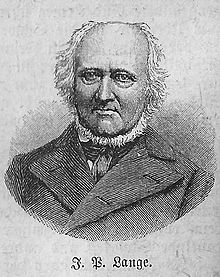
“The grand distinction between Christianity and all systems of philosophy, and all other religions, so called, consists in this, that it is not a mere system of notions, but a series of facts. Its first promulgators could all adopt, as their own, the words of John: “That which we have seen and heard declare we unto you” (1 John 1:1–3). It is this that makes it everlasting; for deeds once done can never be altered: it is this that makes it universal; for duly accredited facts fall within the reach of those also who could not follow a chain of abstract reasoning: it is this that makes it so mighty; for simple facts are stronger than the most elaborate arguments. That a thorough investigation of these facts is a duty, may be taught us by Luke; but their reality being once ascertained, it results, from his words to Theophilus, that the ἀσφάλεια of the faith can no longer be called in question. Would that they who, in reading the Gospel narratives, have continually in their mouths the words, myth, tradition, legend, might enter into the spirit of Luke’s prologue, and, after due research, might feel and experience that here, if anywhere, they are treading on the firm ground of the most unquestionable reality!”
J. P. Lange, 1802-1884
John Peter Lange and J. J. van Oosterzee, A Commentary on the Holy Scriptures: Luke, trans. Philip Schaff and Charles C. Starbuck (Bellingham, WA: Logos Bible Software, 2008), 13.


 unspoken fact is that a “saviour” is already enthroned in Rome-Caesar Augustus, whose monuments declare him “saviour of the world.” Against this backdrop the anticipation of a savior within Israel seems fraught with danger, as the pious figures we meet in Luke’s Gospel invoke OT promises of deliverance. Zechariah speaks of a “mighty saviour” and of being “saved from our enemies” (Lk 1:69, 71 NRSV). Simeon, who has been looking for the “consolation of Israel,” thanks God that he has lived to see God’s “salvation” (Lk 2:30) in the face of the infant Jesus. And the aged Anna rejoices over the child in the presence of all who are “looking for the redemption of Jerusalem” (Lk 2:38 NRSV). John the Baptist also speaks of a great judgment and renewal within Israel associated with the coming of the Lord. Luke summarizes John’s activity with the biblical image of preparing a highway for the divine warrior so that “all flesh shall see the salvation of God” (Lk 3:6 NRSV; cf. Is 40:5 LXX).
unspoken fact is that a “saviour” is already enthroned in Rome-Caesar Augustus, whose monuments declare him “saviour of the world.” Against this backdrop the anticipation of a savior within Israel seems fraught with danger, as the pious figures we meet in Luke’s Gospel invoke OT promises of deliverance. Zechariah speaks of a “mighty saviour” and of being “saved from our enemies” (Lk 1:69, 71 NRSV). Simeon, who has been looking for the “consolation of Israel,” thanks God that he has lived to see God’s “salvation” (Lk 2:30) in the face of the infant Jesus. And the aged Anna rejoices over the child in the presence of all who are “looking for the redemption of Jerusalem” (Lk 2:38 NRSV). John the Baptist also speaks of a great judgment and renewal within Israel associated with the coming of the Lord. Luke summarizes John’s activity with the biblical image of preparing a highway for the divine warrior so that “all flesh shall see the salvation of God” (Lk 3:6 NRSV; cf. Is 40:5 LXX).